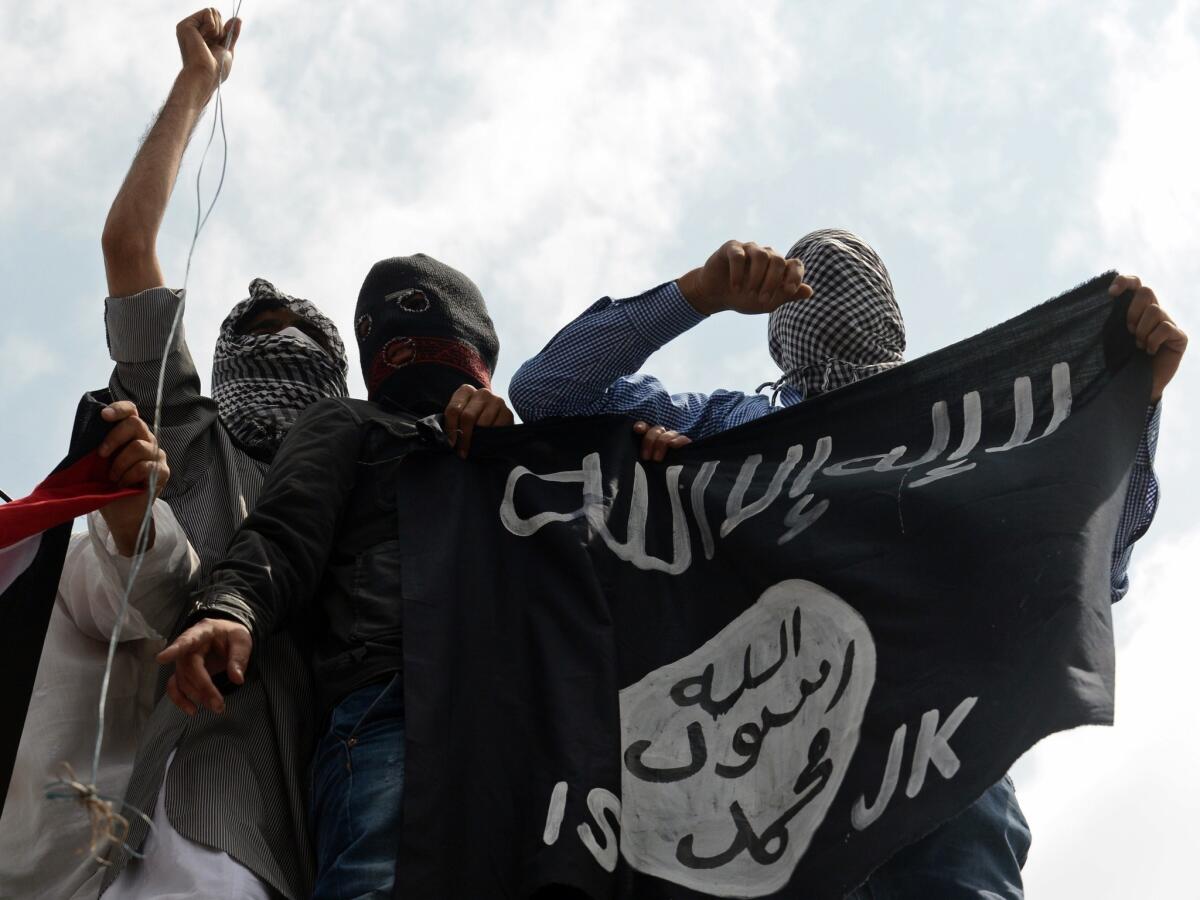Al Qaeda leader says terrorist network branching out to India

Reporting from Mumbai, India — Like any leader of a struggling international brand, Al Qaeda chief Ayman Zawahiri is looking to India as a growth market.
The announcement of a new Al Qaeda branch in the Indian subcontinent marks a bid to reclaim the mantle of global jihad from rival Islamic State, which has attracted militants from across the world in its march across Syria and Iraq, analysts said Thursday.
In a nearly hourlong video released online, Zawahiri said the new Al Qaeda branch seeks “to raise the flag of jihad, return the Islamic rule and [empower] the sharia of God across the Indian subcontinent.”
India’s Interior Ministry on Thursday alerted “all states and security agencies to take possible precautionary steps,” the Press Trust of India reported, although Zawahiri issued no specific threat.
The appeal comes three months after the inauguration of Indian Prime Minister Narendra Modi, a Hindu nationalist whose governing party has long been accused of sectarianism. Modi had been accused of not stepping in to calm communal riots in 2002 in the western state of Gujarat, where he was chief executive. The violence killed 1,000 people, mostly Muslims.
In the video, Zawahiri referred to Gujarat and Ahmedabad, its largest city, as well as to Assam and Kashmir, two Indian states with large and restive Muslim populations. He also mentioned Bangladesh and Myanmar, whose Rohingya Muslim minority has been oppressed by majority Buddhists, and said the region “was once part of the lands of the Muslims, until the enemy occupied it and fragmented it and split it.”
Zawahiri “wants to depict Modi as an enemy of Islam,” said Bruce Riedel, a retired CIA officer who is director of the Brookings Intelligence Project in Washington. “He has a long history of portraying India as part of the Zionist-Crusader threat to Islam.”
But analysts believe that Al Qaeda, even with its fresh focus on South Asia, won’t quickly supplant Islamic State, whose ruthless ambition and battlefield prowess have pushed Al Qaeda into the background of the militant Islamic movement it pioneered.
India, whose Muslim population of about 175 million is one of the world’s largest, has not been a fertile recruiting ground for Al Qaeda, largely because Indian Muslims historically have not felt the insecurity and disillusionment that draw non-Arabs to the organization, experts say.
Islamic State is a much younger organization, but its wealth and sophisticated use of social media have attracted fighters from the United States and Europe to the lands it controls in Iraq and Syria, where it has declared a caliphate. Indian authorities say that four men from the Mumbai area traveled to Iraq this summer to join the group; one was reported killed in fighting there last week.
“That’s a dangerous development,” said K.C. Singh, a retired diplomat and former counter-terrorism coordinator for the Indian Foreign Ministry. “We’ve never really heard of Indian boys being recruited by Al Qaeda.... If I was in the government, I would consider the Islamic State a more serious threat.”
The Al Qaeda video was seen as a meager attempt by the aging, reclusive Zawahiri, who took over after the United States killed Osama bin Laden in 2011, to compete with Abu Bakr Baghdadi, Islamic State’s unabashed chief. Baghdadi has declared himself caliph, or leader of all the world’s Muslims.
Islamic State was closely tied to Al Qaeda until February, when Zawahiri disowned the group, reportedly because of its brutality. Al Qaeda retains authority over some regional affiliates, including those in Yemen, North Africa and Somalia, as well as Al Nusra Front, an Islamic State rival in Syria. But analysts say a growing number of small Al Qaeda splinter groups have pledged loyalty to Islamic State in recent months.
In the video, Zawahiri criticized “discord” among militant groups and called on Muslims across the Indian subcontinent to support Al Qaeda with “opinion and advice, money and gear, and supplication.”
“Publicity and propaganda are Al Qaeda’s principal operational tools, and it is likely that they are endeavoring to catch up with Islamic State’s extensive media coverage,” said Sameer Patil, a national security expert at Gateway House, a think tank based in Mumbai.
Zawahiri said Al Qaeda has spent two years gathering recruits from across South Asia for the new group, which includes fighters from the Taliban in Afghanistan and reports to the Taliban’s Pakistan-based leader, Mullah Mohammed Omar.
Al Qaeda’s previous attempt to create an offshoot focused on South Asia collapsed in 2011, when senior operative Ilyas Kashmiri, a Pakistani national, was killed in a U.S. drone strike.
“Even now it would be very tough for them to establish an infrastructure in India,” said Amir Rana, director of the Pakistan Institute for Peace Studies in Islamabad, Pakistan. “It may be able to establish it in some part of the Indian side of Kashmir. In the past it had failed to attract Rohingya Muslims in Myanmar.”
Al Qaeda has links in Pakistan with the militant group Lashkar-e-Taiba, which is suspected of carrying out the 2008 terrorist attacks in Mumbai and a recent attack on the Indian Consulate in western Afghanistan. But elements of the Pakistani military establishment are widely believed to exert authority over Lashkar-e-Taiba and would be unwilling to cede control to Al Qaeda, experts say.
“The Pakistani army doesn’t want Al Qaeda to get on the agenda, because then they can’t switch it on and off,” Singh said. “If Lashkar goes on the global agenda, they [Pakistan] are not a player.”
Special correspondent Aoun Sahi in Islamabad contributed to this report.
For more news from the Indian subcontinent, follow @SBengali on Twitter
More to Read
Sign up for Essential California
The most important California stories and recommendations in your inbox every morning.
You may occasionally receive promotional content from the Los Angeles Times.










